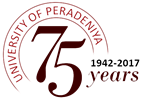University of Peradeniya
The University of Peradeniya is the heir to the oldest
university tradition in Sri Lanka as the successor to the
University of Ceylon, the first institution of its kind
in the country. Its founding on the 1st of July
in 1942, as an autonomous corporation, was the fulfilment
of hopes and expectations of many who had been campaigning
for a university in this country. It is located on a site
of great natural beauty, just 8km from the city of Kandy
- the historic capital of the last independent kingdom of
Sri Lanka - and 100km from Colombo, the current capital
of the country. The university covers about 700 hectares
of land located on the flood plains of Mahaweli river as
well as on the lower slopes of the Hantana mountain range.
The developed area, known as the University Park, is about
150 hectares while the rest of the land remains forested.
The university consists of eight academic faculties. About
1800 undergraduates enter the university annually, to make
up an undergraduate student population of 6600, and the
total number of postgraduate students registered is over
1200. Out of the total undergraduate student population,
about 5100 are provided with accommodation on and around
campus. The University of Peradeniya is celebrating its
Diamond Jubilee in 2017.
Faculty of Arts
The history of the Faculty of Arts dates back to the
early beginnings of university education in Sri Lanka. The
predecessor to the Faculty of Arts in Peradeniya University
was established in Colombo, as part of the University of
Ceylon, as two faculties called the Faculty of Arts and
the Faculty of Oriental Studies. These two faculties were
moved to Peradeniya in 1952, and were amalgamated in 1972
to form the Faculty of Arts.
The twenty years from 1952 to 1972 saw the expansion of
the Faculty of Arts and Oriental Studies. The original seven
departments of study of the two faculties were Classics,
Economics, English, Geography, History, Oriental Languages
and Philosophy. The Department of Oriental Languages was
divided in 1943 into the four separate departments of Sinhalese,
Tamil, Pali and Sanskrit.
This was followed by the addition of several other academic
disciplines to the faculty: Law and Arabic in 1945; Sociology,
Education and Modern Languages in 1949 (French and German
had been taught for many years as subsidiary subjects);
Archaeology in 1959; and Buddhist Philosophy in 1964. The
most recent additions to the faculty are the departments
of Fine Arts, Management Studies and Law established respectively
in 2001, 2002 and 2009. A sub-department of English for
the Teaching of English as a Second Language was set up
after non-English medium students entered the university.
In addition, French is available as a subject to students
following the General Degree Programme.
The Faculty of Arts of the University of Peradeniya is one
of the premier centres of teaching and research in the Humanities
and the Social Sciences in Sri Lanka. It has a long established
research tradition and a highly respected publication record.
It also conducts the oldest continuing Academic Seminar
Series in the Sri Lankan university system, the Ceylon Studies
Seminar. In 1942 the faculty brought out the first academic
journal in the Social Sciences and the Humanities to be
published in Sri Lanka, the University of Ceylon Review.
After the publication of this journal was discontinued in
1965, the faculty commenced the publishing of two separate
journals, the Sri Lanka Journal of the Humanities and Modern
Sri Lanka Studies. In 2002 the faculty commenced publishing
two new journals, Sambhavana (in Sinhala) and
Palkhalai (in Tamil). Individual members of the
academic staff of the Faculty of Arts participate in projects
funded by many local and foreign agencies. Members of the
faculty also provide consultancy services to various organizations.
The Department of Archaeology cooperates with the Government
Department of Archaeology in many activities, including
the Cultural Triangle Project. The Departments of Economics,
Geography, Sociology, Political Science, and Pali and Buddhist
Studies, among others, also provide expertise and consulting
services to various government agencies.
